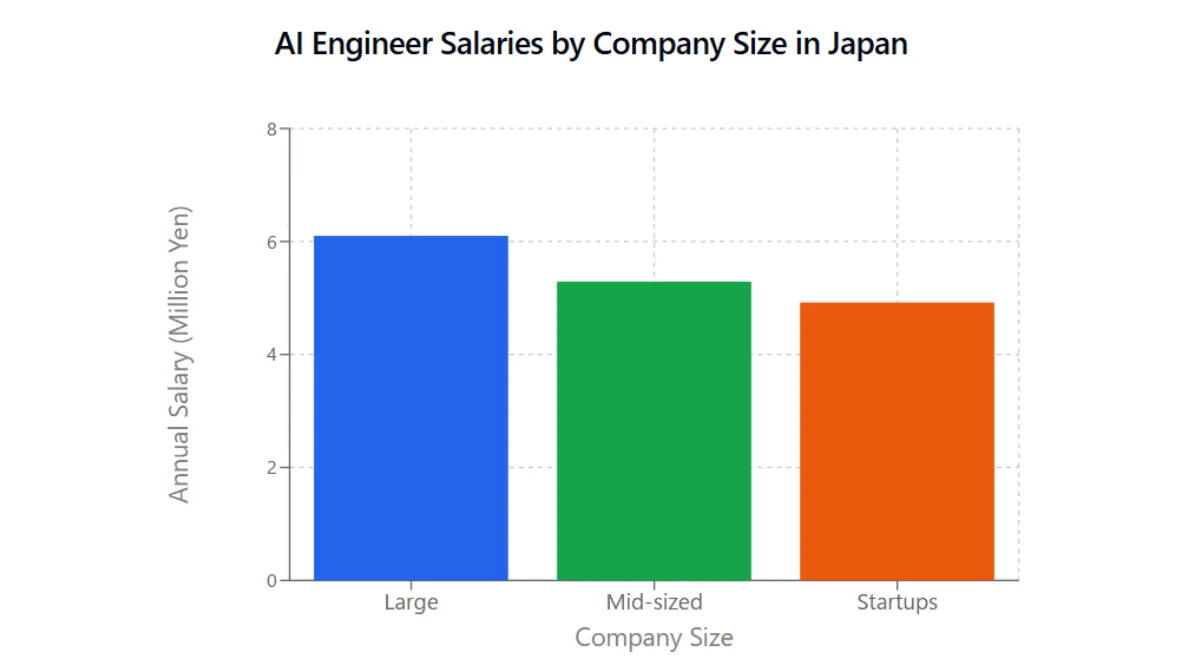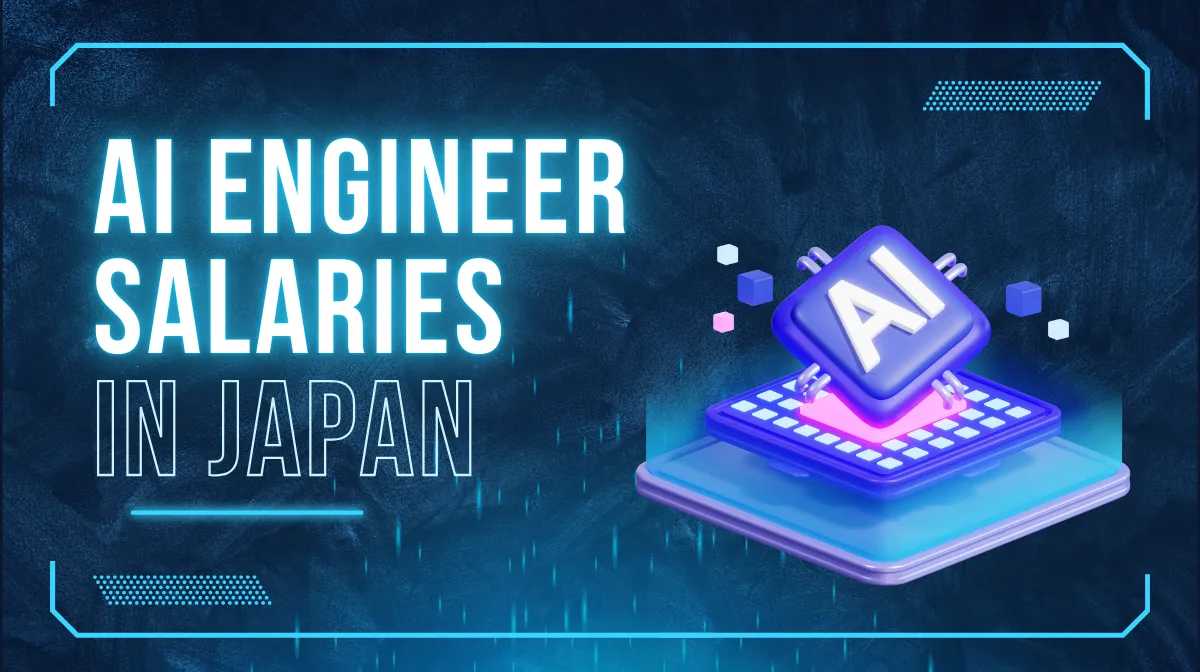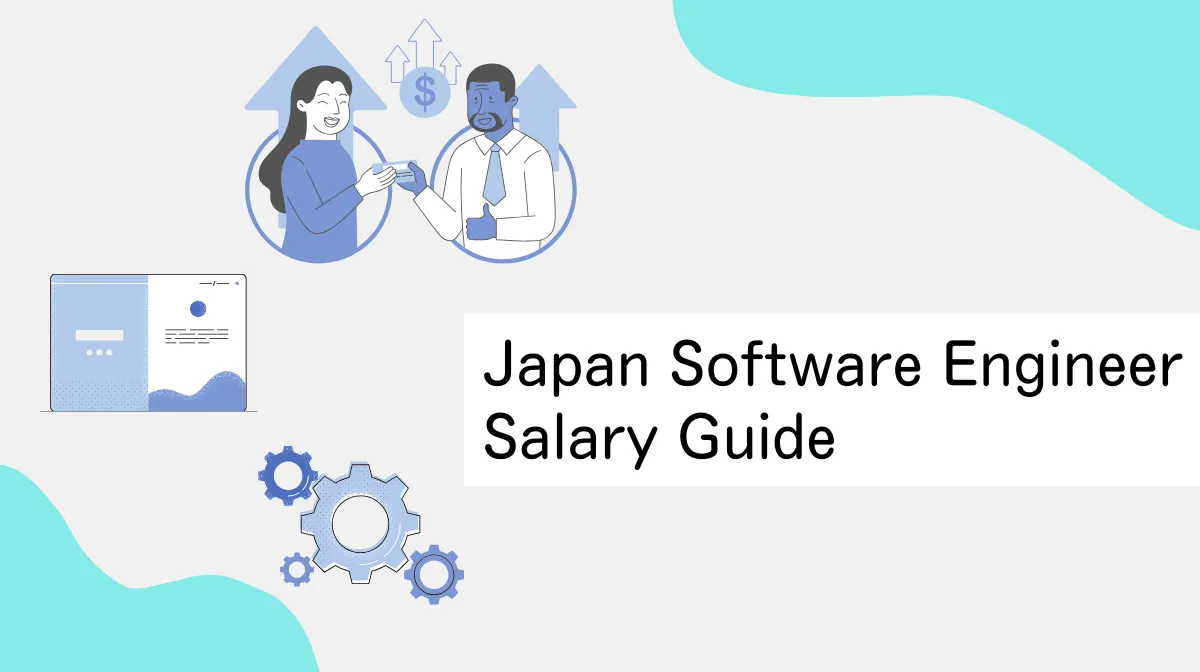As the demand for AI engineers continues to surge, salaries and annual compensation are showing an upward trend.
The average annual salary for AI engineers in Japan is 5.98 million yen, with some earning over 10 million yen depending on their experience and employer.
This article provides a detailed analysis of AI engineer salary ranges, methods to increase income, and future prospects, based on the latest data.
- Average AI engineer salaries in Japan by company type
- How to increase your AI engineering income
- Future salary trends and career outlook
1.Understanding AI Engineer Salary Ranges in Japan

Let’s examine the salary ranges for AI engineers in Japan. AI engineer compensation tends to be higher than the average salary for regular full-time employees.
Average Annual Salary of AI Engineers in Japan: 5.583 Million Yen
Average annual salary for AI engineers in Japan is 5.583 million yen, which is significantly higher than that of typical full-time employees.
AI engineers are specialists who work on developing and advancing artificial intelligence, and their compensation reflects the high level of technical expertise and knowledge required for the role.
As companies intensify their efforts to secure AI talent, industry-wide salary levels continue to show an upward trend.
Salary Range: 3.6 Million to Over 10 Million Yen
AI engineer salaries vary greatly depending on experience and specialization, ranging from around 3.6 million yen to over 10 million yen.
Entry-level engineers and those early in their careers typically start at around 4 million yen, with gradual increases as they gain experience.
Professionals with high specialization or expertise in cutting-edge technologies can reach annual salaries exceeding 10 million yen relatively early in their careers.
Bonus and Take-Home Pay Reality
The median monthly take-home pay for AI engineers is approximately 450,000 yen, typically supplemented by bi-annual bonuses.
The standard bonus amount ranges from 1.5 to 2.0 times the monthly base salary, with high-performing companies sometimes offering even more.
Specifically, the salary structure typically consists of
- Base salary
400,000 – 500,000 yen per month - Various allowances (including overtime)
50,000 – 100,000 yen per month - Bonuses
Twice yearly, totaling 3-4 months of base salary
Many companies offer additional special allowances for skilled AI engineers, such as technical bonuses and project allowances, which contribute to higher total compensation.
2. AI Engineer Salaries by Company Size

AI engineer salaries vary depending on company size. Let’s examine the characteristics and compensation differences across different company scales.
Large Companies: Average Over 6.1 Million Yen
AI engineers at large companies (1,000+ employees) earn an average annual salary of over 6.1 million yen, exceeding the industry average.
Large companies typically offer regular salary increases and reliable bonus payments, with standard monthly base salaries of 398,000 yen and annual bonuses around 1.33 million yen.
These companies often handle large-scale AI projects and offer positions with annual salaries exceeding 10 million yen for those with strong technical skills.
Mid-sized Companies: Average 5.29 Million Yen
At mid-sized companies (100-999 employees), AI engineers earn an average annual salary of 5.29 million yen. The typical monthly salary is around 361,000 yen, with annual bonuses averaging 956,000 yen.
A notable characteristic of mid-sized companies is that individual contributions tend to be more directly reflected in compensation, with the possibility of earning salaries comparable to large companies based on performance.
Startup Salary Reality
AI engineers at startups (fewer than 100 employees) earn an average annual salary of 4.92 million yen, with monthly salaries around 360,000 yen and annual bonuses averaging 602,000 yen.
However, startups with innovative AI technologies often offer stock options as part of their compensation package, which can lead to significant income growth as the company expands.
Understanding Company Size Characteristics
For reference, here are the characteristic benefits by company size:
Large Companies: Stable salary increase systems and comprehensive benefits Mid-sized Companies: Performance-based evaluation and flexible compensation negotiations Startups: Rapid salary growth potential and stock-based compensation opportunities
■日本でエンジニアとしてキャリアアップしたい方へ
海外エンジニア転職支援サービス『 Bloomtech Career 』にご相談ください。「英語OK」「ビザサポートあり」「高年収企業」など、外国人エンジニア向けの求人を多数掲載。専任のキャリアアドバイザーが、あなたのスキル・希望に合った最適な日本企業をご紹介します。
▼簡単・無料!30秒で登録完了!まずはお気軽にご連絡ください!
Bloomtech Careerに無料相談してみる
3. Salary Comparison by Employer Type

Let’s examine the compensation differences across various employer types, including foreign companies, domestic tech giants, and research institutions.
Performance-driven foreign companies typically offer the highest salary levels.
Outstanding Compensation at Foreign Companies
AI engineer salaries at foreign companies are notably higher compared to domestic companies.
For example, Chinese telecommunications giant Huawei has been known to offer exceptional compensation packages of up to 30 million yen annually for talented new graduates in AI engineering roles.
At U.S. tech companies like Google and Meta (formerly Facebook), experienced AI engineers commonly earn well over 10 million yen annually.
Top-tier AI talent can command compensation packages worth hundreds of millions of yen.
Domestic Tech Giants’ Compensation Practices
Major domestic tech companies are actively increasing their compensation for AI engineers.
For instance, SONY offers up to 7.3 million yen in first-year compensation for talented AI professionals.
DeNA’s “Engineer AI Specialist Course” offers annual salaries ranging from 6 to 10 million yen, even for new graduates.
NEC has established special measures offering annual salaries exceeding 10 million yen for outstanding AI researchers, demonstrating a growing trend among domestic companies to offer competitive compensation comparable to foreign firms.
Research Institutions and Universities’ Salary Structure
Base salaries for AI engineers at research institutions and universities tend to be somewhat modest compared to private sector companies.
However, they offer abundant opportunities for additional income through industry-academia collaboration projects, external research funding, and intellectual property rights revenue.
It’s not uncommon for total annual income to exceed 10 million yen, particularly at national research and development institutions conducting cutting-edge AI research or prestigious universities with extensive industry collaborations.
Understanding Income Characteristics by Employer Type
Foreign Companies: Very high base salaries with substantial stock compensation
Domestic Tech Companies: Special hiring frameworks with high compensation and technical allowances
Research Institutions/Universities: Characterized by additional income from research funds and intellectual property rights
4. Methods to Increase AI Engineer Salaries

What methods and key points should AI engineers consider for increasing their compensation?
Let’s examine three specific strategies.
Aim for 10 Million Yen Through Specialization
To achieve an annual salary of 10 million yen as an AI engineer, deep technical expertise in specific areas is essential.
You can significantly increase your market value by developing specialized skills in areas such as machine learning, deep learning, natural language processing, or computer vision.
Specifically, it’s important to build a track record through actual projects, research paper publications, and speaking engagements at technical conferences to demonstrate your expertise.
Increase Income Through Management Skills
Project management capabilities in AI projects can be a powerful tool for income growth.
By gaining experience as a project manager or tech lead in addition to technical skills, you can step up to higher compensation brackets.
There is particularly high demand in the AI field for management talent who can balance technical understanding with business value creation. Such roles often come with annual compensation exceeding 15 million yen.
Secure High-Rate Projects as a Freelancer
Freelance AI engineers are increasingly able to secure projects paying 600,000 to 800,000 yen monthly.
Engineers with specialized expertise or project management skills can access high-rate projects paying over 1.5 million yen monthly.
However, securing stable high-rate projects requires building a strong track record and powerful network.
■日本でエンジニアとしてキャリアアップしたい方へ
海外エンジニア転職支援サービス『 Bloomtech Career 』にご相談ください。「英語OK」「ビザサポートあり」「高年収企業」など、外国人エンジニア向けの求人を多数掲載。専任のキャリアアドバイザーが、あなたのスキル・希望に合った最適な日本企業をご紹介します。
▼簡単・無料!30秒で登録完了!まずはお気軽にご連絡ください!
Bloomtech Careerに無料相談してみる
5. Skill Sets for Achieving Higher Compensation
A skill set refers to the knowledge, abilities, experience, and technical skills necessary for work.
Let’s examine the skill sets AI engineers need to achieve higher compensation.
Essential Technical Skills
Solid technical capabilities form the foundation for high income as an AI engineer. Practical ability to use Python-based machine learning frameworks (TensorFlow, PyTorch) is essential.
Additionally, skills that provide immediate value in practical applications are required, such as AI/ML environment building and operation in cloud platforms (AWS, Azure, GCP), database design, and API development.
Recently, experience in implementing and optimizing Large Language Models (LLMs) has become a major factor in increasing market value.
Required Business Skills
In addition to technical capabilities, the ability to create business value is an important factor in increasing income. Let’s look at three specific areas:
Consulting Capability
- Understanding client business challenges and proposing AI solutions
Resource Management Ability
- Considering project profitability
Communication Skills
- Effective communication with team members
English communication skills are also essential for success in global projects and foreign companies.
Effective Certifications for Career Advancement
While practical experience is most valued in the AI field, certain certifications can strengthen salary negotiations. It’s important to obtain certifications that demonstrate technical capability:
- Google Cloud Professional Machine Learning Engineer
- AWS Machine Learning Specialty
- Deep Learning Expert Certification
Additionally, PMP (Project Management Professional) and AGILE certifications are effective ways to demonstrate management capabilities.
Effective Skill Composition for Salary Increases
Core Technical Skills
- Machine learning/deep learning implementation
- Cloud infrastructure building and operation
- Large-scale data processing
Business Skills
- Requirements definition and proposal capability
- Project management
- Communication skills
Value-Added Skills
- Deep industry knowledge
- Ability to keep up with latest technologies
6. Future Market Trends and Salary Prospects

Let’s examine the future trends in the IT industry, AI engineering field, and salary prospects.
AI engineering is expected to become one of the most in-demand professions going forward.
AI Talent Demand Forecast
According to Ministry of Economy, Trade and Industry predictions, the shortage of IT talent, including AI engineers, will reach approximately 790,000 by 2030.
Particularly in the AI field, demand for specialized talent has surged with the rapid development of generative AI, exemplified by ChatGPT.
Companies from large enterprises to startups are strengthening their recruitment of AI engineers, and this trend is expected to accelerate further.
As the supply-demand balance for talent tightens, the market value of AI engineers is expected to continue rising.
Future Salary Outlook
As AI technology implementation accelerates in society, AI engineer salary levels are expected to continue their upward trend.
Compensation is expected to rise particularly for engineers with skills in cutting-edge areas such as generative AI, reinforcement learning, and edge AI.
As competition for talent intensifies globally, Japanese companies are increasingly likely to adopt international-standard compensation systems.
Talented AI engineers can expect further salary increases. It’s quite possible that the average annual salary for experienced AI engineers will exceed 10 million yen in the future.
7. AI Engineer Salaries and Careers in Japan Hold Great Potential
AI engineering is attracting attention as a profession offering stable income, backed by high specialization and demand.
Demand is expected to increase further, particularly with the development of generative AI.
Career advancement opportunities will continue to expand by combining technical skill improvement with business skill acquisition.
A career as an AI engineer continues to hold great potential for the future.
■Related Reading
The following article provides a detailed explanation of software engineer salaries in Japan, including average annual income and market trends.



















